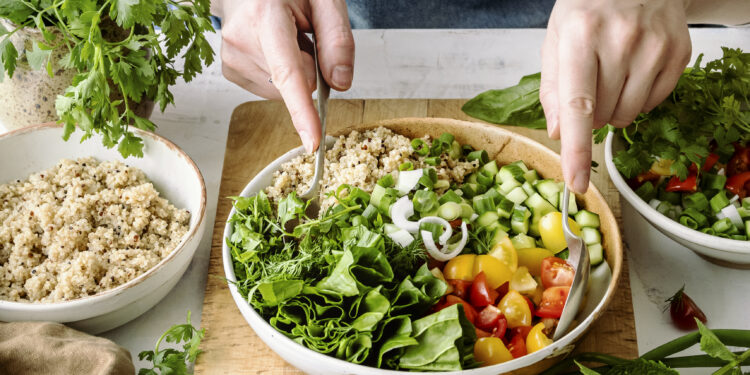As parents, ensuring that your kids grow up healthy, strong, and full of energy is always a top priority. From their first bites of food to their teenage years, what they eat plays a critical role in their development and well-being. Lately, plant-based diets have been gaining popularity, and many families are exploring this lifestyle for their little ones. But what exactly is a plant-based diet for kids? Is it safe? And how can you make sure your child gets the right nutrients? In this comprehensive guide, we’ll dive deep into everything parents need to know about a plant-based diet for kids.
What is a Plant-Based Diet?
A plant-based diet focuses primarily on foods derived from plants. These include vegetables, fruits, whole grains, legumes, nuts, and seeds. Unlike vegetarian or vegan diets, plant-based eating doesn’t necessarily mean the total exclusion of animal products, but it emphasizes plant foods as the main source of nutrition. This approach encourages the consumption of nutrient-dense foods while minimizing processed items and animal-based products.
For kids, this means feeding them more vegetables, fruits, whole grains, beans, lentils, nuts, seeds, and plant-based alternatives, such as plant milk or plant-based meat substitutes.
Why Choose a Plant-Based Diet for Kids?
As parents, it’s natural to want the best for your child. A plant-based diet for kids offers numerous health benefits when done right:
1. Packed with Nutrients
Plant-based foods are full of vitamins, minerals, antioxidants, and fiber that are essential for your child’s growth and development. For example, leafy greens provide calcium and iron, fruits are rich in vitamins like vitamin C, and whole grains offer B-vitamins that are important for energy.
2. Promotes Healthy Growth
A diet rich in fruits, vegetables, and plant-based proteins can support your child’s growth by giving them the proper nutrients to build strong muscles and bones. Since plant-based foods are generally lower in unhealthy fats and processed sugars, it also helps reduce the risk of obesity, heart disease, and other health issues later in life.
3. Improved Digestion
Plant-based foods are naturally high in fiber, which promotes healthy digestion and prevents constipation—something many kids struggle with. Fiber also supports gut health, which is crucial for overall immune function and nutrient absorption.
4. Sustainable and Eco-friendly
Choosing plant-based foods for your child is also a way of teaching them about environmental responsibility. Plant-based diets have a smaller carbon footprint compared to meat-heavy diets, helping reduce the impact of your family on the environment.
5. May Reduce the Risk of Chronic Illnesses
Studies show that plant-based diets can help reduce the risk of chronic diseases, such as heart disease, diabetes, and certain cancers. Introducing your child to a variety of plant-based foods early on can help them develop a taste for nutritious, whole foods that protect against such conditions in the long term.
Essential Nutrients for Kids on a Plant-Based Diet
While a plant-based diet can be very healthy, it’s important to make sure that your child is getting all the necessary nutrients they need. Here’s a look at some essential nutrients to focus on when planning your child’s meals:
1. Protein
Protein is important for muscle development, immune function, and overall growth. Fortunately, plant-based sources of protein are abundant. Foods like beans, lentils, chickpeas, quinoa, tofu, tempeh, and edamame provide a good dose of plant protein. Nuts and seeds, such as almonds, sunflower seeds, and chia seeds, are also excellent sources.
2. Iron
Iron is essential for energy and healthy red blood cells. Although plant-based iron (non-heme iron) isn’t as easily absorbed by the body as animal-based iron, it’s still readily available in foods like spinach, lentils, beans, tofu, quinoa, and fortified cereals. To boost absorption, pair iron-rich foods with foods high in vitamin C, such as citrus fruits or bell peppers.
3. Calcium
Calcium is important for developing strong bones and teeth. Many plant-based milk alternatives (such as almond milk or soy milk) are fortified with calcium, as are certain plant-based yogurts. Dark leafy greens like kale, collard greens, and bok choy also provide calcium, along with tofu and fortified cereals.
4. Vitamin B12
Vitamin B12 is crucial for nerve function and the production of red blood cells. This vitamin is naturally found in animal products, so for a plant-based diet, it’s essential to incorporate B12-fortified foods (such as plant milk, nutritional yeast, and cereals) or consider a B12 supplement after consulting with your pediatrician.
5. Vitamin D
Vitamin D supports bone health and immune function. It can be a challenge to get enough vitamin D from food alone, so exposure to sunlight is important. You can also provide vitamin D through fortified plant-based milk, fortified orange juice, and supplements if necessary.
6. Omega-3 Fatty Acids
Omega-3 fatty acids are essential for brain development and cognitive function. Plant-based sources include flaxseeds, chia seeds, walnuts, and hemp seeds. You can add these to smoothies, cereals, or baked goods for an extra nutritional boost.
7. Zinc
Zinc is necessary for growth, immune health, and wound healing. Good plant sources of zinc include beans, lentils, chickpeas, nuts, seeds, and whole grains. It’s important to make sure your child is getting enough zinc, as it can be more difficult to absorb from plant foods than from animal products.
How to Make a Plant-Based Diet Fun for Kids
Making the transition to a plant-based diet doesn’t have to be complicated, and it can actually be a fun and rewarding experience for both you and your child. Here are some tips to help your little ones enjoy their new plant-powered meals:
1. Make It Colorful
Kids love colorful foods, so make their meals visually appealing by incorporating a variety of colorful fruits and vegetables. Serve rainbow bowls with vibrant berries, leafy greens, orange carrots, purple sweet potatoes, and red bell peppers.
2. Get Creative with Plant-Based Alternatives
If your child loves traditional comfort foods like macaroni and cheese or burgers, don’t worry! There are plenty of plant-based alternatives that taste just as delicious. You can make a creamy “cheese” sauce with cashews or nutritional yeast, or opt for veggie burgers made with black beans, lentils, or chickpeas.
3. Involve Your Kids in Meal Prep
Get your kids involved in meal planning and preparation. Children are more likely to try new foods when they’ve helped create them. Let them chop vegetables (with supervision) or mix ingredients for smoothies and baked goods. It’s a fun way to teach them about healthy eating while creating lasting memories.
4. Use Dips and Sauces
Kids love to dip their food, so make plant-based dips and sauces a staple in your home. Hummus, guacamole, and homemade salsa are great options to serve with veggies or whole-grain crackers. You can even make a simple peanut butter or almond butter dip for fruit slices.
5. Start Slow
If your child is used to a diet that includes a lot of animal products, it might be helpful to gradually introduce plant-based meals. Start with a plant-based dinner once or twice a week, then slowly increase the number of plant-based meals until it becomes a natural part of their routine.
Potential Challenges and How to Overcome Them
While a plant-based diet can be extremely beneficial for kids, it does come with its challenges. Here are a few hurdles you might face and how to handle them:
1. Picky Eating
Kids are notorious for being picky eaters. If your child is reluctant to eat vegetables or try new plant-based foods, be patient and persistent. Offer a variety of options, try different preparation methods (roasting, steaming, sautéing), and keep introducing new foods without pressure.
2. Social Situations
At school parties, birthday gatherings, or family dinners, your child may encounter situations where plant-based foods are not available. Prepare by packing plant-based snacks and meals for outings, and explain to your child why they are choosing plant-based options to encourage understanding and avoid feelings of exclusion.
3. Time and Convenience
Plant-based cooking can sometimes seem time-consuming, but with some planning, it can be just as quick and easy as preparing traditional meals. Stock up on quick-to-make items like canned beans, frozen vegetables, and pre-washed greens, and try batch-cooking grains and legumes to use throughout the week.
Conclusion: Raising Healthy, Happy Kids with a Plant-Based Diet
Adopting a plant-based diet for your kids can be a powerful way to nurture their growth, health, and development while promoting a lifestyle that benefits the planet. With proper planning and an eye on essential nutrients, your child can thrive on a plant-based diet that’s full of flavor, variety, and nutritional goodness. The key is to keep meals fun, colorful, and diverse—ensuring your kids are not only getting the nutrition they need but also developing a love for healthy food that will last a lifetime.
So, whether you’re already transitioning to a plant-based lifestyle or just beginning to explore, know that you’re on the right track toward raising healthy, happy, and well-nourished kids. Happy eating!



